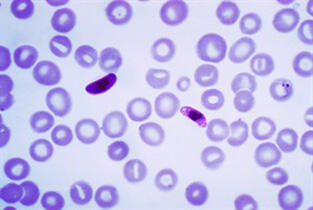
LSTM’s seminar series continued this week with a presentation by Dr Ilaria Russo, an honorary research fellow at LSTM, who has recently joined the University of Manchester to start a new research group to study human malaria. Her seminar “Plasmodium: a treasure chest of molecular targets to chase” was introduced by LSTM’s Dr Giancarlo Biagini.
Dr Russo began by looking at the WHO Malaria Report for 2013, which saw encouraging drops in both morbidity (-29%) and mortality (-45%) which was due to a massive amount of investment into both treatment and control measures. However she cautioned that while advancements have been made Malaria remains a global health threat, and alarmingly there is a paucity of new drugs with novel modes of action close to registration.
Dr Russo pointed out that perhaps the biggest problem was the lack of knowledge about the basic mechanisms regulating the life cycle and virulence of Plasmodium, the parasite that causes malaria, and that a challenge was to identify weak points in the parasite that could be targeted for drug development.
Dr Russo identified essential vs dispensable genes from the 6000 known genes in the parasite’s genome. The presentation then ended in a productive discussion from both staff and students of the technical feasibility and challenges of her novel approach which has significant potential to de-convolute the biology of this enigmatic parasite.